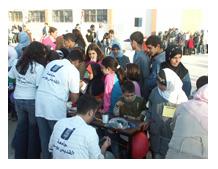Operation 7eme Jour
Université Saint-Joseph
The Opération 7ème Jour’s main guideline is solidarity. This is what motivated, spontaneously at first, students and academic staff of the Université Saint-Joseph concerned with the disastrous effects and repercussions of the summer 2006 in Lebanon. In the aftermath of the war’s devastation, the university recognized the need for a mobilization of resources. For this reason, in September of 2006, the Rector of USJ, Professor René Chamussy, launched Opération 7ème Jour, engaging students, faculty, and staff in volunteer activities to provide assistance to the population of South Lebanon. Since 2006, Opération 7ème Jour has transformed from an emergency relief effort to a large-scale development program with activities across Lebanon. Working closely with NGOs, government agencies, and local authorities, the program has continued and expanded its activities, managing development and health care initiatives in an even larger geographic area, with contributions from faculty and students from every academic discipline.
From the inception of Opération 7ème Jour, students, teachers and staff members were invited to invest themselves in voluntary actions carried out by seven multidisciplinary cells: legal, civil engineering, social, health and human development, dialogue, communication and information, and environment and tourism. These cells have recently been expanded and diversified to fully utilize the university’s expertise and human resources. In the summer of 2007, the geographic scope of the project also expanded, and it shifted from a purely voluntary focus to an emphasis on approaching relief and development from an academic perspective. It has become a core part of USJ’s academic experience. Claire Zablit, Dean of the Faculty of Nursing and coordinator of the health and human development cell, said that her objective as an educator is “to not only teach students to be qualified health professionals, but also responsible citizens.”
Opération 7ème Jour has provided a wide range of services to communities across Lebanon. Medical students and faculty have provided health exams, treatments, education on diseases, and psychological counseling. USJ has undertaken reconstruction and improvements on local schools and other buildings, and the creation of two public libraries in war-ravaged communities. The program has also provided cultural events, community development assistance, and training for teachers and volunteers. Other volunteers have worked on reforestation and other environmental projects.
In addition to these material benefits to the communities which Opération 7ème Jour serves, one of the major goals of the program since its launch has been to increase social solidarity among a multi-confessional population. According to Nayla Hocheimy, Assistant to the Vice President for International Relations, “An intercultural approach guided the activities that took place. We chose to set workshops in multi-confessional villages and areas, with the clear objective of spreading the sense of solidarity and openness among populations often divided by their religious affiliations and deeply affected by political disputes.”
The program has been a resounding success and has grown rapidly, and USJ continues to focus on improving the program: by increasing the number of volunteers involved; merging students’ service work into their academic curriculum more seamlessly; expanding their services to meet pressing social needs; and strengthening the program’s institutional structure. Already, Opération 7ème Jour provides an outstanding model for large-scale, institutionalized, multi-disciplinary civic engagement programs, and it will continue to do so as it grows and adapts.
Learn more at the Opération 7ème Jour website>>